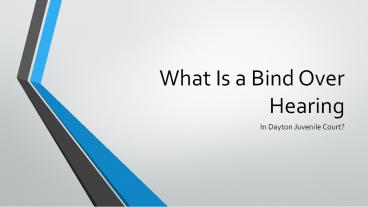In Dayton Juvenile Court What Is A Bindover Hearing - PowerPoint PPT Presentation
Title:
In Dayton Juvenile Court What Is A Bindover Hearing
Description:
Increasingly, the government continues to be cracking on drug offenses, white collar offense and crimes committed over the Internet. Fees and penalties for federal crimes are severe; there is not any parole or guaranteed pathway to plea bargaining. There is an endless supply of lawyers with the federal government and they will put their unrestricted pocketbook to make use of prosecuting these crimes. This is why you need representation from the experienced attorneys with Patrick Mulligan & Associates. They specialize in these types of crimes and will give your situation the focus it deserves. They represent clients in all elements of trial and appellate practice throughout the whole United States and are registered in the U.S. Supreme Court. – PowerPoint PPT presentation
Number of Views:8
Title: In Dayton Juvenile Court What Is A Bindover Hearing
1
What Is a Bind Over Hearing
- In Dayton Juvenile Court?
2
Bind Over Hearing Juvenile Court
Dayton Juvenile Courts seeks collaborative
efforts to inspire best practices and make
significant modifications to the methods in legal
courts. These legal courts execute realistic
methods depending on investigation along with
concepts of teenage progress. The reason behind
is to set up a juvenile drug court that's driven
analysis and science so as to encourage far
better outcomes for the youths and their family
members. It is extremely important for the
opponent to appoint a reliable Dayton criminal
lawyer for example attorney Patrick Mulligan to
ensure she or he is ensured a decent trial.
3
Bind Over Hearing Juvenile Court
When is the child tried as an adult? As per the
legal description, a child is one who is below
age eighteen. Nonetheless, if the child is aged
fourteen or older during the time of the offense,
he can be tried as an adult. Almost all the
juvenile cases start out with a felony charge.
The child has to be tried as an adult in some
cases while in some, only if necessary for court.
Seek advice from an expert Dayton criminal lawyer
for your case since every single case is
different and specific.
4
Bind Over Hearing Juvenile Court
What is bindover? Before the youngster could be
moved to another courtroom for trial, the court
needs to be sure and execute proceedings. This
technique is called bind over or relinquishment
proceedings, waiver, and transfer. After the
transfer has been instructed, the court sets the
terms and conditions of bail. Under specific
conditions, the child might get moved to a
detention facility for adults or in the proper
officer. The authority of the juvenile court on
that case will get over. But, the case could
possibly get shifted to the juvenile court for
more consideration if the youngster pled guilty
to in adult court or even was eventually found
guilty. Before a juvenile might get moved, the
court must determine if the juvenile has done the
alleged act and if the child was Fifteen years or
older during the time of the crime. The act might
be a felony if done by an adult.
5
Bind Over Hearing Juvenile Court
What makes Bindover exclusive? Bindover is
distinctive to juvenile courts because it is
partly a primary hearing and partly a sentencing
hearing From the time the turn of the century,
the Bindover procedure have become a regular
element of the juvenile court. There is a bind
over process practically in every state. However,
the method remains questionable and includes an
implied acknowledgement that the juvenile
judicial system isn't intended for all youngsters.
6
Bind Over Hearing Juvenile Court
Rules of Juvenile Procedure allows a juvenile to
waive their legal right to a hearing on the
situation of amenability, as long as allowable by
the courtroom. The court has the right to
determine whether the waiver is purposeful and
the juvenile must understand that they're letting
go of the consequences of that activity. The
legislature has changed the rules to prevent the
juvenile courts from forcing an automatic bind
over for upcoming offenses. The juvenile court
cannot bind over a juvenile because she or he has
been earlier bound over. A person should always
consult legal advice from a specialist like Ohio
Legal Help and receive particular information for
their individual circumstance.
7
Bind Over Hearing Juvenile Court
L. Patrick Mulligan Associates L.P.A. Co. 28 N
Wilkinson St Dayton, OH 45402 (937)
228-9790 https//www.youtube.com/watch?vRqf5JV2W
W5g

